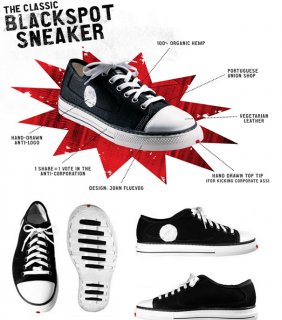fash ho' said:Are sustainability and fashion mutually exclusive, a contradiction in terms? Can you be stylish and sustainable, or does eco-fashion still equal 'granola' greenstyle?
Do you think about issues such as the environment, anti-consumerism or labour practices when you buy?
Is vintage sustainable when you get it shipped around the world?
Any thoughts, stories, pictures about these issues?
Hi Fash ho'!
 Good thread, these are all issues I think about a lot. To the first questions: heavens no, sustainability and fashion are not mutually exclusive...I don't understand why the market seems to believe ecological fashion has to equal "granola" style either. Perhaps some random statistic exists that the greatest market of aware buyers prefers this style, I don't know. The only thing I perhaps find regrettable in terms of the fashion business system, besides the way it's manufactured...is that fashion is treated so disposably. I hate the idea of trends, as well as the system of churning out two collections yearly, advertising them to death, and throwing out previous leftovers. I think that, besides the waste, it gets pretty boring, and discourages the production of, and appreciation of, really good pieces that can be respected for decades to come.
Good thread, these are all issues I think about a lot. To the first questions: heavens no, sustainability and fashion are not mutually exclusive...I don't understand why the market seems to believe ecological fashion has to equal "granola" style either. Perhaps some random statistic exists that the greatest market of aware buyers prefers this style, I don't know. The only thing I perhaps find regrettable in terms of the fashion business system, besides the way it's manufactured...is that fashion is treated so disposably. I hate the idea of trends, as well as the system of churning out two collections yearly, advertising them to death, and throwing out previous leftovers. I think that, besides the waste, it gets pretty boring, and discourages the production of, and appreciation of, really good pieces that can be respected for decades to come. Otherwise, haute couture is pretty sustainable, no? I also like to wear good items for a long time, and vintage has always been a favorite way to shop for many reasons.
I'm not sure I understand the question about vintage being shipped around the world, though.
Have you looked in the fair trade thread? It's a good thread, with various sources and issues being discussed. I have a feeling maybe not many people responded because of there being similar threads and because of the wide scope of this one. Thanks for bringing it up, it's a topic that can never be discussed enough.







 Voluntary simplicity... What do you think that could mean to you in your own lives?
Voluntary simplicity... What do you think that could mean to you in your own lives?

